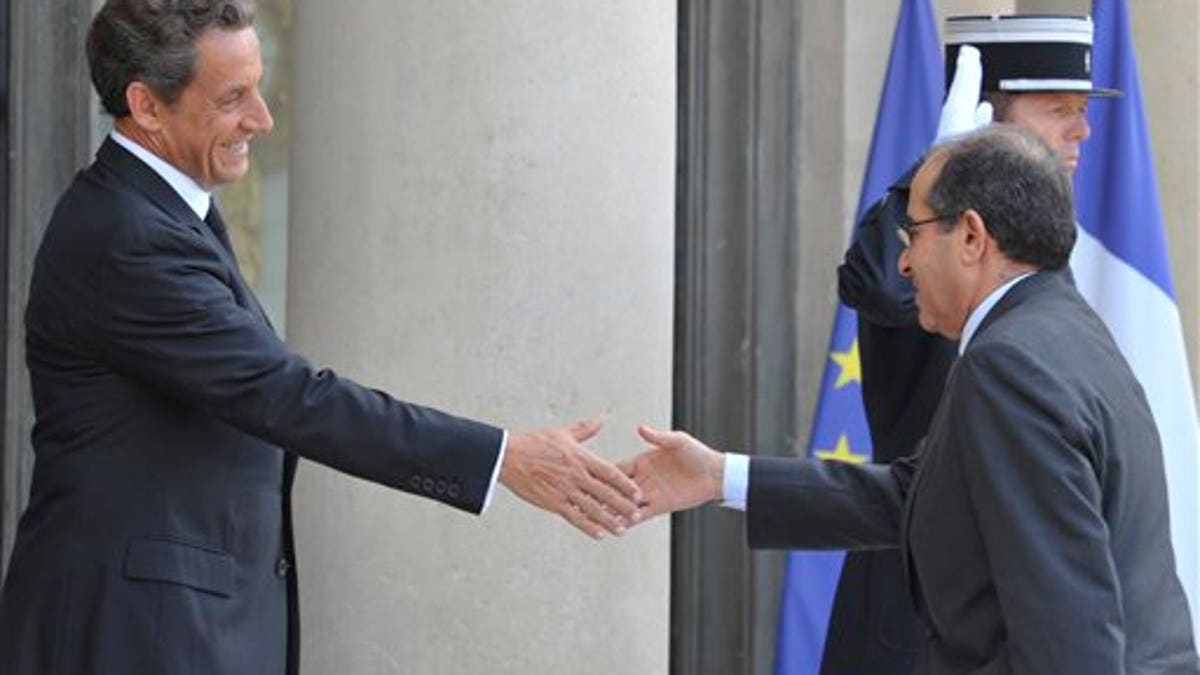
August 24: France's President Nicolas Sarkozy greets the head of Libya's opposition government, Mahmoud Jibril, at the Elysee Palace in Paris. (AP)
BRUSSELS – NATO planners are drawing up options for a possible NATO role in Libya after the civil war in the North African nation ends, officials said Wednesday.
NATO's governing body -- the North Atlantic Council -- has told its military staff to brainstorm ways to assist a future U.N. mission to stabilize the country.
"The council provided the NATO military authorities with a set of political guidelines for a possible future NATO supporting role in Libya ... in support of wider international efforts," NATO spokeswoman Oana Lungescu said.
Planners are expected to come up with options in the next week to present to the alliance's political leadership.
NATO warplanes have flown nearly 20,000 sorties to Libya in the past five months, including about 7,500 strike attacks against Muammar Qaddafi's forces. But the campaign has exposed deep fissures within the alliance, with only eight of its 28 members taking part in the military action.
Diplomats say a number of member states have been unhappy with the intervention in Libya, saying it was detracting attention and resources from NATO's main mission in Afghanistan, where the 10-year war against the Taliban has not been going well for the alliance.
As a result, any follow-on mission in Libya is expected to be of limited size and duration.
The U.N. has already made significant progress in planning for a post-conflict stabilization effort in Libya.
Lungescu said the North Atlantic Council had agreed that any possible future supporting role for NATO must "satisfy the criteria of a demonstrable need, a sound legal basis and wide regional support."
Another condition was that NATO would not have any "sustained" troop presence on the ground in Libya, officials said.
A senior NATO officer who spoke on condition of anonymity because the planning was still in its initial stages, said support for the U.N. mission could consist of air and sea deliveries of humanitarian aid as well as setting up training programs for Libyan security personnel in Europe.
The alliance claims to have unmatched experience in the reform of armed forces from authoritarian nations, based on its work with East European military and police forces after the 1991 collapse of the Soviet Union.
Other assistance to the U.N. mission could consist of logistical support, or reconnaissance aircraft and unmanned drones to provide surveillance over Libya.
The North Atlantic Council on Wednesday briefed ambassadors of partner nations on future plans in Libya. Five non-NATO countries have joined the alliance in the Libyan campaign -- Jordan, Qatar, Sweden, the United Arab Emirates and Morocco.
Qatar and UAE in particular sent warplanes and provided key diplomatic support and financial aid to the anti-Qaddafi opposition. They are likely to continue playing a role in support of stabilization and reconstruction efforts.
